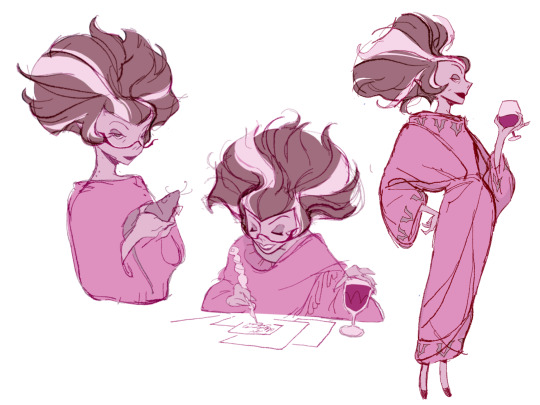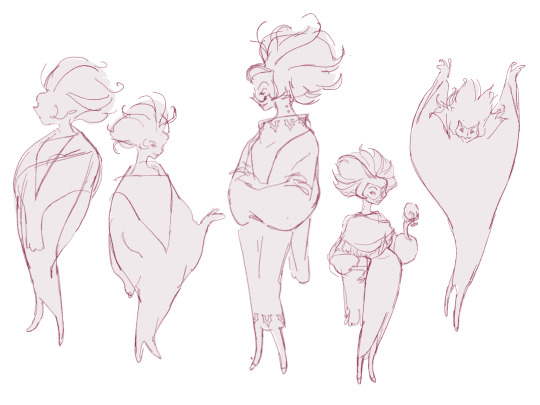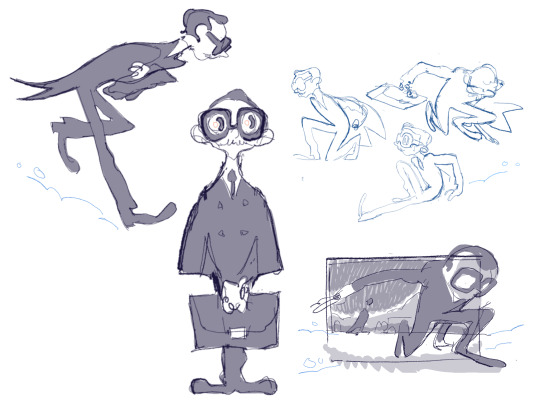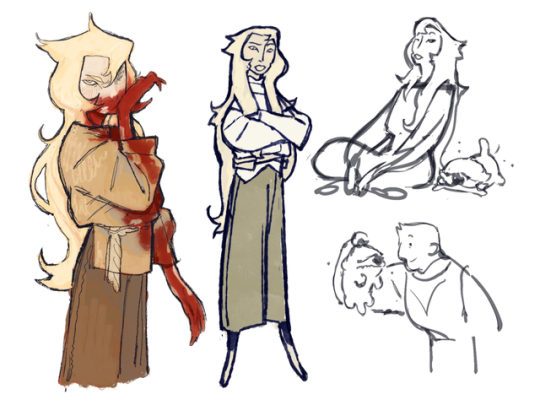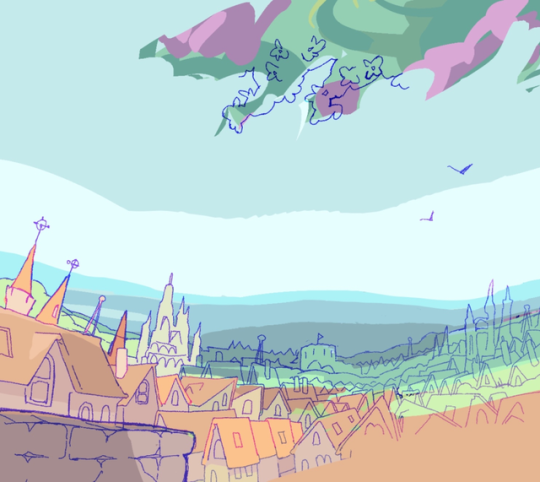Don't wanna be here? Send us removal request.
Text
I wonder if there is like a vampire equivalent of food culture.
Like how Italians get upset if you break the spaghet.
"You're not supposed to snap the neck of your victim, not approved!"
299 notes
·
View notes
Text
Have you read the book Convenience Store Woman? I think you’d like that book.
Like here's the thing...
Some people like working retail. They like folding clothes and helping people buy things and managing a store.
Some people like working as teachers. They like going into work and helping children learn and grading papers.
Some people like being librarians and helping people discovering books. And coming up with programs to give to their patrons.
Some people like being baristas. They like making coffee and getting creative with the drinks that they make. They like chatting with regulars and helping people discover what flavors they do and don't like.
Some people like working fast food. They like the fast pace. They like the almost game like aspect of it where you have to get people what they need as fast as people. They like prepping the food in the same way every time being it relaxes and soothes them.
Some people like cleaning garbage. They like beautifying and organizing space. They like knowing that the work that they do helps the world stay beautiful and keeps plants, animals, and people safe and clean. They like the meditative quality of it and sometimes they can teach others the importance of keeping spaces clean or maybe just finding new and interesting people to talk to.
BUT WE CANNOT DO THAT BECAUSE NO ONE IS PAYING A LIVING WAGE.
I wish I could just stay at home and spend my life reading and reviewing books and writing my silly little stories on my silly little tumblr. Self publish a book or two maybe once or twice a year and just spend my life in my own personal library just encouraging others to read.
BUT I CANT DO THAT. BECAUSE THAT DOESN'T PAY ME ENOUGH. SO I AM STUCK HERE WORKING MY ASS OFF IN A JOB I DON'T LIKE BUT DON'T HATE SLOWLY GRINDING MY LIFE AWAY.
I think that is why I am so stuck on wage transparency and pressuring Congress to raise the minimum wage. Like people want to do those jobs that seem menial and stupid. They LIKE those jobs. They deserve to be able to do them and live the lives they want.
A Garbage Collector deserves to collect the garbage and take their family to Disney should they want to.
A Librarian deserves to shelve their books and then go home and spend however much they want on their Pokemon collection.
If a teacher who spends way too much time on grading wants to spend their summer backpacking across Europe to unwind from the school year they should be able to do that with having to worry about losing their house.
All jobs are worthy of dignity and respect and this is why we need labor unions and higher minimum wage and companies to stop buying up all the fucking houses. Like there are so many problems in this country I have no idea which one to tackle first, but I know who to blame.
Fuck you Ronald Reagan.
14 notes
·
View notes
Text
Some quick information about why calling sex work "the world's oldest profession" is racist!





Read the full article about it here.
796 notes
·
View notes
Text
About them falling off heights, part of it is that hamsters have crappy eyesight, which can make it difficult for them to know if there’s a drop in front of them.
"funny hamster death stories" Kills u with 100 hammers
3 notes
·
View notes
Text

Elijah,you put that cigarette out,you can hold her.
1K notes
·
View notes
Text
THANK YOU. The worst is when people insist that someone, (especially my parents, who are both wonderful people,) sexually abused me. Like, even if that was true, you can’t just drop that on someone.
Modest Person: I dress modest as a choice! I do it for my own personal reasons or for faith, but it's my choice. It's more than just dressing this way, to me modesty is-
Everyone: Oh mY gOsH! WhO's MaKiNg yOu Do ThAt? I fEel sO bAd fOr YoU!!!!
Modest Person: Oh-It's actually my choice
Everyone: I jUsT fEeL SoOoO bAd? WaNt To bOrrOw My ClOtheS? I wOn'T teLL.
Vs.
Influencer: *wears a modest outfit in a pic*
Everyone: Omg! What a cute trend! Long skirts are sooo cute!
608 notes
·
View notes
Text
can we talk about the sexualization of nuns and how odd that is? like sexualizing a group of women who literally dedicated their entire life to modesty just feels so wrong, i'm not a religious person but sexualizing people who literally try their hardest to stay away from that is not okay T-T /gen
661 notes
·
View notes
Text
Please, if you can, take a moment to read and share this because I feel like I'm screaming underwater.
NPD (Narcissistic Personality Disorder) stigma is rampant right now, and seems to be getting progressively worse. Everyone is using it as a buzzword in the worst ways possible, spreading misinformation and hatred against a real disorder.
I could go on a long time about how this happened, why it's factually incorrect (and what the disorder actually IS), why it's harmful, and the changes I'd like to see. But to keep this concise, I'll simply link to a few posts under the cut for further reading.
The point of this post is a plea. Please help stop the spread of stigma. Even in mental health communities, even around others with personality disorders, in neurodivergent "safe" spaces, other communities I thought people would be supportive in (e.g. trans support groups, progressive spaces in general), it keeps coming up. So I'm willing to bet that a lot of people on this site need to see this.
Because it's so hard to exist in this world.
My disorder already makes me feel as if I'm worthless and unlovable, like there's something inherently wrong and damaged about me. And it's so much harder to fight that and heal when my daily life consists of:
Laughing and spending time with my friends, doing my utmost best to connect and stay present and focused on them, trying to let my guards down and be real and believe I'm lovable- when suddenly they throw out the word "narcissist" to describe horrible people or someone they hate, or the conversation turns to how evil "people with narcissistic personality disorder" are. (Seriously, you don't know which of your friends might have NPD and feels like shit when you say those things & now knows that you'd hate them if you knew.)
Trying to look up "mental health positivity for people with npd", "mental health positivity cluster bs", only to find a) none of that, and b) more of the same old vile shit that makes me feel terrible about myself.
Having a hard time (which is constant at this point) and trying to look up resources for myself, only to again, find the same stigma. And no resources.
Not having any clue how to help myself, because even the mental health field is spitting so much vitriol at people with DISORDERS (who they're supposed to be helping!) that there's no solid research or therapy programs for people like me.
Losing close friends when they find out, despite us having had a good relationship before, and them KNOWING me and knowing that I'm not like the trending image of pwNPD. Because now they only see me through the lens of stigma and misinformation.
Hearing the same stigma come up literally wherever I go. Clubs. Meetings. Any online space. At the bus stop. At the mall. At a restaurant. At work. Buzzword of the year that everyone loooves loudly throwing around with their friends or over the phone. Feels awesome for me, makes my day so much better/s
I could go on for a long time, but I'm scared no one will read/rb this if it gets too much longer.
So please. Stop using the word "narcissist" as a synonym for "abusive".
Stop bringing up people you hate who you believe to have NPD because of a stigmatizing article full of misinformation whenever someone with actual NPD opens their mouth. (Imagine if people did that with any other disorder! "Hey, I'm autistic." "Oh... my old roommate screamed at me whenever I made noise around him, and didn't understand my needs, which seems like sensory overload and difficulty with social cues. He was definitely autistic. But as long as you're self-aware and always restraining your innate desire to be an abusive asshole, you're okay I guess, maybe." ...See how offensive and ignorant that is?)
Stop preventing healthcare for people with a disorder just because it's trendy to use us as a scapegoat.
If you got this far, thank you for reading, and please share this if you can. Further reading is under the cut.
NPD Criteria, re-written by someone who actually has NPD
Stigma in the DSM
Common perception of the DSM criteria vs how someone may actually experience them (Keep in mind that this is the way I personally experience these symptoms, and that presentation can vary a lot between individuals)
"Idk, the stigma is right though, because I've known a lot of people with NPD who are jerks, so I'm going to continue to support the blockage of treatment for this condition."
(All of these were written by me, because I didn't want to link to other folks' posts without permission, but if you want to add your own links in reblogs or replies please feel free <3)
8K notes
·
View notes
Text
If you couldn't look that animal in the face and truthfully say
"I promise that I am 100% ready and willing to provide you with whatever you need, be that shelter, food, water, adequate attention and stimulation, veterinary care, etc., will do that even when I don't feel like it, and will never neglect or abuse you,"
then please do not adopt/purchase them.
3 notes
·
View notes
Text
I read somewhere that in Germany you have to sign a legally binding contract to get a pet essentially saying that you’re not going to abuse it, and I 100% agree if for no other reason than it will make people take a second to think about their decision.
I feel like there should be more animal laws or at least transparency on how high maintenance pets truly are, like if you get one you’re essentially committing yourself to taking care of a live thing for usually at least a decade
78 notes
·
View notes
Text

PEACOCKS
The last zine page I'm gonna share for now! And edgiest yet, but since it's dedicated to pretty much my favourite album ever I really wanted to show you this. Ironically, despite how heavy it is narratively it helped me go through so many ups and downs since I found out about TMG ~10 years ago. My favourite forever and always. ✌ Also I must say it feels so strange to draw emotionally heavy illustrations, such as this one, when I'm feeling absolutely great IRL. That was the case with all of the darker pictures in this series and it felt genuinely odd, I guess I just never drew such themes when I was feeling good - but it feels nice to have that distance. 2025 makes me endlessly happy and hopeful so far (even if it's incredibly busy and I don't get to have much time to rest XD) and I want to stress this as I post a tiny Jagal falling into the void, haha. That guy is DEFINITELY not me ✌
310 notes
·
View notes
Text
Similarly, I have a stuffed gnome in my room, and when my budgie drops a feather that’s particularly pretty, I put it on the gnome’s beard for safekeeping.

Love is stored in the hawk 🤎
4K notes
·
View notes
Text
Time Travel Question 52: Medievalish and Earlier
These Questions are the result of suggestions a the previous iteration. This category may include suggestions made too late to fall into the correct earlier time grouping. In some cases a culture lasted a really long time and I grouped them by whether it was likely the later or earlier grouping made the most sense with the information I had.
Please add new suggestions below if you have them for future consideration. All cultures and time periods welcome.
We already did the burnings which lost their bracket, but the culture lasted a long time across a big area, and people keep suggesting it.
277 notes
·
View notes
Text
'i asked chatgpt' ok well i asked the trees that speak latin and they told me to tell you that you're a cunt
664 notes
·
View notes
Text

I've read people saying that autistic people should be full on sterilized! I'm honestly worried with autism being more and more demonized in the States!
1K notes
·
View notes


